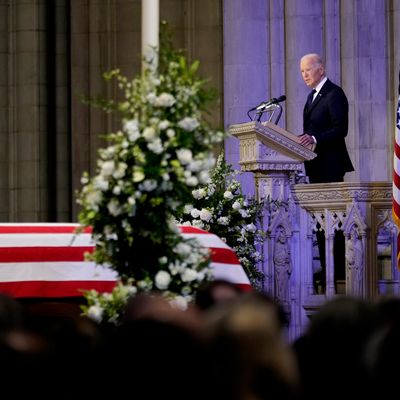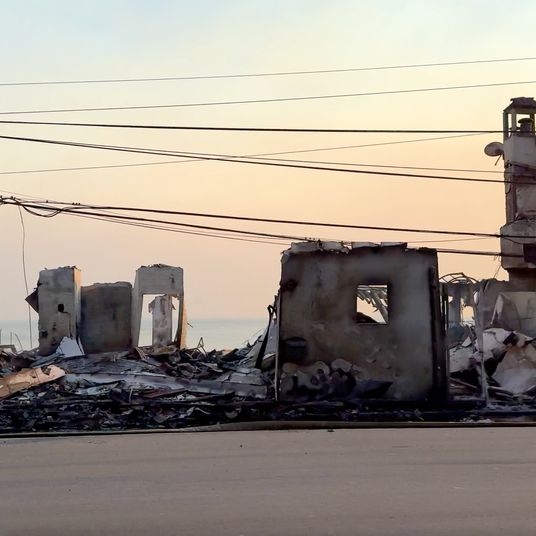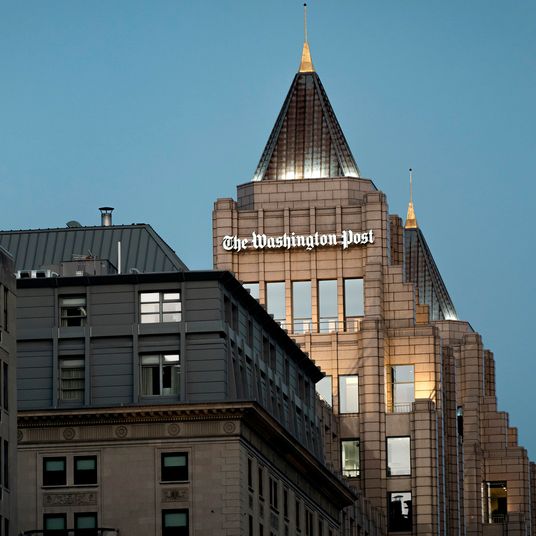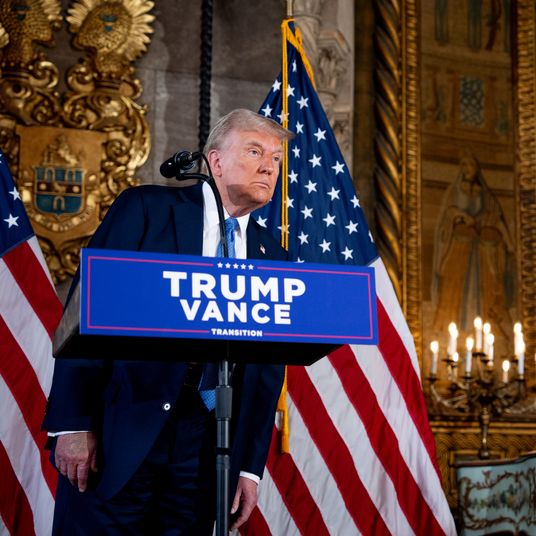
The state funeral of the 39th president, Jimmy Carter, at the National Cathedral in Washington on Thursday had all the trappings of the traditional suspension of political warfare in the face of death. Every living ex-president (and most of their vice-presidents) was there, which led to hallucinatory moments like Barack Obama amiably chitchatting with Donald Trump as they sat next to each other in the pews. Among the many eulogies to the Georgian, one that definitely stood out was one written before his own death by the 38th president, Gerald Ford, Carter’s Republican opponent in 1976, who wrote movingly of the partnership and friendship the two men formed during their long post–White House years. It was both sad and touching that the current chief executive, Joe Biden, reached back nearly a half-century to his own endorsement of Carter’s presidential candidacy in the year he defeated Ford.
But it was impossible to forget for a moment that the solemn event that brought this disparate audience together was occurring just 11 days before the re-inauguration of Donal Trump. The incoming president differs in so many respects from Jimmy Carter, and his return to power is a living repudiation of so much of what Carter believed in.
In his own view, Carter’s inveterate truthfulness was his most important personal virtue; “I’ll never lie to you,” he often said when running for president in a country anguished by Tricky Dick Nixon’s administration. Whether or not Carter was able to live up to this lofty commitment to honesty, it contrasts dramatically with Trump’s extremely flexible attitude toward facts and refusal to take personal responsibility for the consequences of his sins (on one infamous occasion, he could not come up with a single thing he had ever done that required divine forgiveness).
Carter’s great legacy in international affairs was his effort to anchor U.S. foreign policy in universal human rights. Trump rejects any standard for foreign policy other than the most naked national self-interest and has gone out of his way to dismiss global standards banning the torture of prisoners of war and military strikes on civilian populations.
Carter had a wonk’s passion for tinkering with government operations to make them more efficient and responsive. Trump is indifferent to the minutiae of governing, and his big reform initiative is to give tech bros Elon Musk and Vivek Ramaswamy license to blow up whole agencies and radically reduce spending as ends in themselves.
In the long arc of political history, Carter is renowned for leading his own southern region out of the darkness of Jim Crow and building a mind-blowing coalition of civil-rights activists and ex-segregationists. Even if you believe Trump is without personal prejudice, he has very clearly made politics safe for a resurgence of racism and has made the pursuit of racial justice and equality a target of legal action and mockery.
As every eulogist at Carter’s funeral emphasized, he was a man of deep and abiding Christian faith, teaching Sunday school back in Plains for many decades. He wasn’t transactional in his religiosity; he took positions on social and cultural issues that led his fellow evangelical Protestants to abandon him and his party, and he led his own congregation out of its traditional denomination when that larger church refused to treat women equally. If Trump has any personal religious convictions, they are largely a secret, and he has formed a highly transactional relationship with conservative Christians, who are forever rationalizing his manifest impiety. Until his wife’s death, Jimmy Carter closed every day reading the Bible in Spanish with Rosalynn. Trump’s relationship with Holy Scripture (other than misquoting it) is mostly limited to hustling expensive Bibles to his devoted followers.
The American presidency is a collection of men with all sorts of varying personalities and backgrounds, and it’s entirely possible someone wildly different from Jimmy Carter is what this country needs. But it’s hard to undertake comparisons of the ex-president who just died and the ex-president who is about to re-enter the White House and see anything other than a devolution in integrity, fidelity to civic and religious traditions, and willingness to work with others peacefully. As Biden succinctly said in his eulogy, Carter’s “enduring attribute” was “character. Character. Character.” What sort of character is Donald Trump?
As a religious believer, Jimmy Carter undoubtedly had faith in the power of a beneficent God to regenerate souls and administer justice, so he’d be the first to pray for the success of Trump’s second administration. I share the same prayers for peace and reconciliation in my own church. But the signs aren’t great. Indeed, the soon-to-be 47th president spoiled any grace note he might have struck by attending his predecessor’s funeral when he openly whined that the half-staff flags honoring Carter would ruin the vibe at his own inauguration. Perhaps he will acquire the decency to think less of himself and more of the people whose lives he is about to change in ways that terrify many of them. Jimmy Carter’s first book was titled Why Not the Best?, and it treated self-improvement as personal and national goal. The self-styled champion of American greatness could take a page from that book and emulate Carter’s understated (and imperfect) greatness in asking himself and his country to live up to its most enduring values.
More on Politics
- What Were Obama and Trump Chatting About at Jimmy Carter’s Funeral?
- Trump Won’t Get the Inauguration Day He Wanted
- Trump Wants to Remind the World He’s Still a ‘Madman’





























